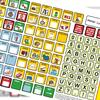Being Prepared is Essential
Being prepared for an emergency is crucial for you and your family, in your home, in your place of business or your school and throughout your community.
Get a Kit. Make a Plan. Be Informed.
Experts, including the American Red Cross, say that being prepared for an emergency takes planning, foresight, cooperation, and diligence. They say, "Get a Kit. Make a Plan. Be Informed."
For people with disabilities, proper planning could be lifesaving. It is essential for people with disabilities, their families, and their support systems to prepare carefully based on their unique needs.

